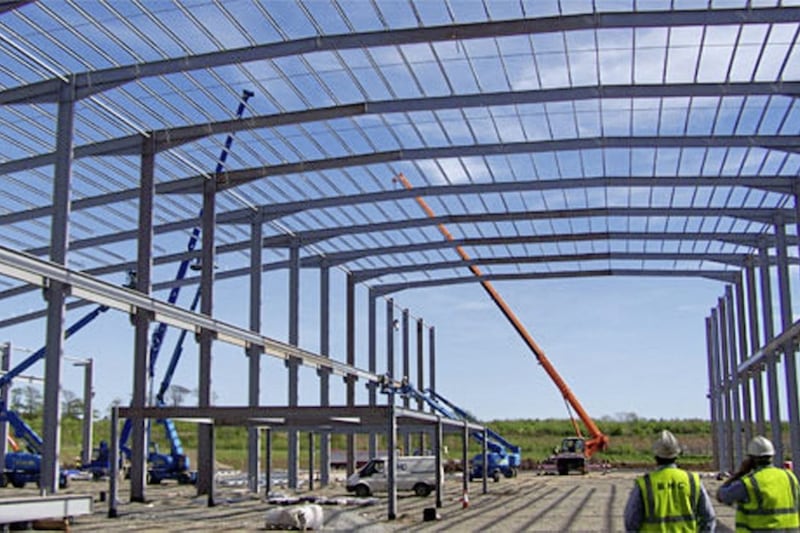THE representative body for the north’s multi-billion pound construction sector is demanding “fundamental reforms” to the funding and governance models of both NI Water and the NI Housing Executive.
The Construction Employers Federation (CEF), which speaks on behalf of 800 businesses employing 30,000 staff directly and 65,000 in the supply chain, wants both organisations to be mutualised.
Mutualisation, which differs from privatisation, is effectively the process of changing the business structure from part-government-owned to a mutual structure where stockholders or customers own a majority of shares, and where the organisations can fund-raise.
It it one of 10 wide-ranging options, including introducing road-tolling, which the CEF has set out in a detailed response to the Department of Finance’s consultation on revenue raising in Northern Ireland beyond just for the day-to-day resource budget.
The CEF says it is critical that an incoming Stormont Executive considers how it would drastically grow its capital budget to meet community needs.
“This is particularly vital as 2024/25 will see, on current plans, a reduction in the Executive’s capital from £2.1 billion to £1.8 billion - the same in cash terms as 2007/08, some 17 years ago,” according to CEF managing director Mark Spence.

And out of that £1.8bn, it is understood NI Water alone would be pitching for around £600m.
Among CEF’s other proposed fund-raising options are agreeing ring-fenced capital funding with the Treasury for specific areas of investment, utilising the full extent of the Executive’s borrowing facility from the National. Loans Fund to fund capital investment, and also reconsidering road tolling
“We believe that our 10 proposals, if implemented, would go a substantial way to putting the capital budget on a sounder footing whilst also giving an incoming Executive the opportunity to deliver on many of the key projects and infrastructure plans which are likely to form part of any Programme for Government,” Mr Spence added.
“From the construction industry’s perspective, their delivery would result in a timely confidence boost that can enable them, their staff and supply chains to work collaboratively with the Executive to ensure we collectively deal with the multitude of infrastructure challenges that we face.”
The CEF’s response to the DoF’s consultation coincides with the publication of its latest construction survey, which collected data from Northern Ireland-headquartered firms which have a collective annual turnover of £2.5bn.
Respondents, not unexpectedly, see the urgent restoration of devolved government as the best way of boosting prospects and confidence into 2024 and beyond.
That restoration, they says, is also crucially important given the need for an incoming Executive to deal with that £300m slash in the public sector capital budget, which presents huge challenges for ministers wanting to deal with matters such as the infrastructure backlog and delivering on additional housing.
Main findings in the survey included:
• 45% of respondents said their turnover had increased by at least 10% in 2023 but 60% saw their profit margins either stay the same or worsen, with only 11% seeing margins improve;
• Over the last year, 75% of firms were operating at full or almost full capacity;
• Key issues identified included specific skills shortages in construction trades, visibility of pipeline and market confidence to recruit new workers, and the perception of construction as an attractive career path;
• Materials shortages are largely resolved, but inflationary issues still remain and were causing financial concern for 27% of respondents.
• Key challenges identified for the next six months are restoring a functioning Executive, the lack of a pipeline of work in Northern Ireland, access to skilled labour, and inflation.

Mr Spence added: “While the pattern of increased turnover remains, the reality for many contractors is that such growth is resulting in ever tighter profit margins due to the accumulated and continued effects of the inflationary pressures of the last three years.
“This, accompanied by a heavily constrained pipeline of new work locally, has resulted in many members expressing significant concern as to the favourability of the market into the New Year.
“The continued lack of an Executive remains a key roadblock towards boosting the sector’s prospects and it is vital that the negotiations that were ongoing before Christmas are speedily revived and brought to a successful conclusion.
“However, it is also important that a return to devolved government is not just a re-run of what has gone before. Rather, it must mean a step-change in terms of delivery and, after many false dawns, result in a number of fundamental reforms which have long been set aside.”








